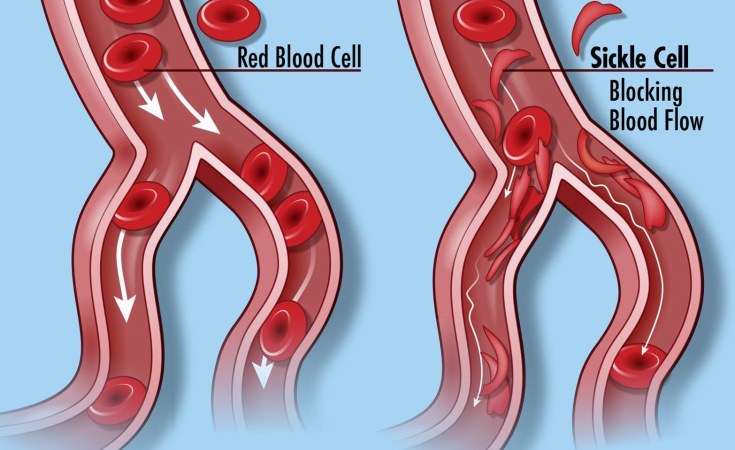Sickle cell disease refers to a group of inherited blood disorders with symptoms like anaemia and blocked blood vessels. About 80% of the world's sickle cell disease cases occur in sub-Saharan Africa. Lack of access to comprehensive healthcare in the region adds to the burden of the disease.
Nigeria has the largest population of individuals with the condition globally. Reports indicate that about 25% of Nigerians carry the gene that causes it and 2% to 3% of the population suffer from sickle cell disease.
The mortality rate for children ranges from 50% to 80%. Clinical presentations vary among sickle cell patients. Some include leg ulcers, fatigue, dizziness and end organ damage.
My team and I at Nigeria's National Institute for Pharmaceutical Research and Development undertook a critical review to investigate the challenges associated with sickle cell disease in sub-Saharan Africa.
We urge governments and relevant stakeholders in this region to prioritise policies that can underpin effective management of the disease. We recommend implementing relevant strategies that will reduce the burden whilst targeting total elimination. These include counselling about how genetic conditions might affect a family. We propose premarital genotype screening and comprehensive health insurance coverage for all sickle cell disease patients.
Gaps in the management of sickle cell disease
Our review focused on publications in English language journals between 2003 and 2021. The review provided insight on relevant medical interventions and helped to identify prospects for overcoming the burden of sickle cell disease.
We found that most of the studies in this area were undertaken in the West African region.
Some centred on hydroxyurea in the management of the condition. This drug treats anaemia by helping to prevent the formation of sickle-shaped red blood cells. It has contributed towards reducing the burden of the disease globally. Furthermore, it was observed that the drug has robust efficacy and safety in the treatment of children with sickle cell anaemia.
Niprisan has also proven to be effective in the management of sickle cell disease. This intervention is classified as a phytomedicine, which refers to medicines derived from plants in their original state. Developed by Nigeria's National Institute for Pharmaceutical Research and Development, it contributed towards reducing the number of hospital admissions among patients.
A review of 55 publications found that access to comprehensive management of sickle cell disease was lacking. Specific interventions such as neonatal screening, early diagnosis and preventive penicillin therapy (an important part of infection prevention in sickle cell disease) were not readily available in countries like Nigeria and the Democratic Republic of Congo.
A lack of adequate knowledge about sickle cell disease in countries like Nigeria, DR Congo, Cameroon and Nigeria contributed to the high prevalence of the condition. A more informed populace will reduce the disease burden. Similarly, poor prioritisation of premarital genetic counselling and screening severely limited its utility in the prevention of the condition. In countries like Cyprus, Greece and Italy, premarital genetic testing is standard practice. However, in most of the reviewed countries, most couples were not aware of genetic counselling. Others did not know the location of facilities which offered the service.
Sickle cell related interventions are expensive. It exposes families to financial hardships as most have to seek loans to pay hospital bills and other healthcare costs. In Nigeria for example, the findings of a study showed that few participants (7.2%) were enrolled in the National Health Insurance Scheme. Monthly household income ranged from ₦12,500 (US$27.15) to ₦330,000 ($716.64), whilst health expenditure was between ₦2500 ($5.43) and ₦215,000 ($466.90). Kenya also has similar examples. Health insurance can be an invaluable tool that can help ease the financial burden associated with the management of sickle cell disease.
Saving West African lives
There is a need to increase public awareness regarding sickle cell disease. This will correct some of the negative attitudes and wrong practices such as disregard for sickle cell screening prior to marriages, as well as a willingness to marry amongst individuals with genotype incompatibility. Campaigns should be targeted at correcting misconceptions that the disease is a death warrant and contagious.
People should know it is possible to live a long life with proper healthcare after diagnosis.
Campaigns aimed at improving relevant knowledge, alongside pre-marital screening and counselling, could significantly reduce the prevalence of the disease in West Africa. One idea could be to use public figures such as musicians, actors and social media celebrities in public awareness campaigns.
Countries with a high burden like Nigeria also need:
- adequately equipped and revitalised health facilities
- regular training of healthcare practitioners
- comprehensive health insurance coverage for all sickle cell disease patients
- higher prioritisation as well as increased investment in research and development.
Given the high prevalence of sickle cell disease in the region, the continent should lead initiatives to end the disease. New multidisciplinary programmes for affected populations need to be considered. Strategies to prevent, reduce, eliminate and manage the disease have to be integrated and pursued aggressively.
A fresh approach needs to harness political will with science-led interventions. Collaboration with private sector entities, development partners and philanthropists must be improved and embedded in strategies. Funding for research and other evidence-based interventions is abysmal - resources must be mobilised to these areas.
Godspower Onavbavba, a researcher at the NIPRD contributed to this article
Obi Peter Adigwe, Director General, National Institute for Pharmaceutical Research and Development


